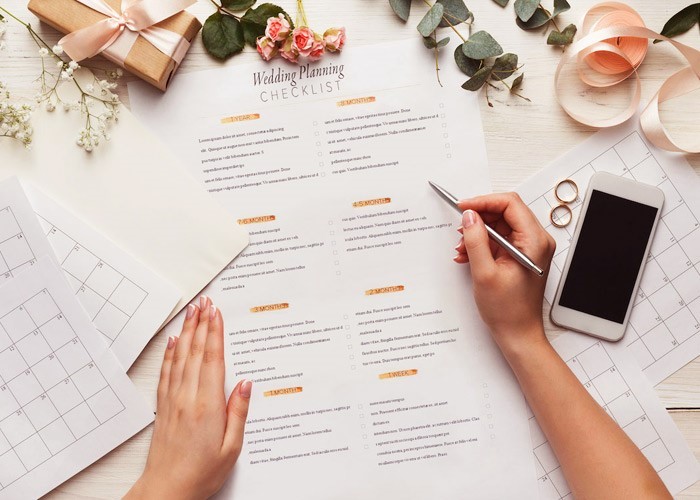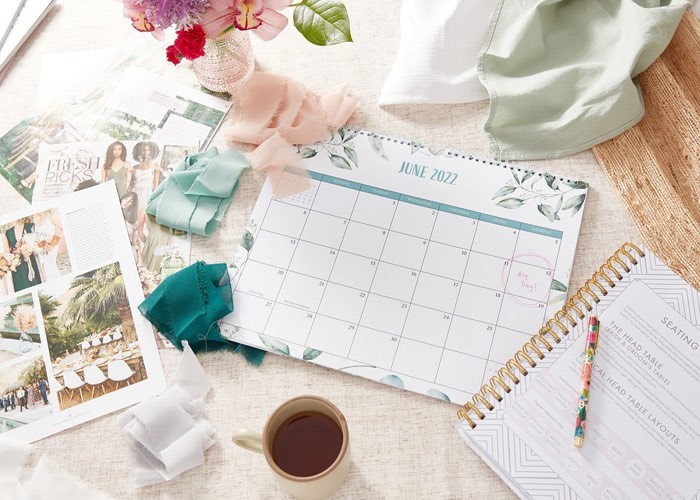HOW TO PLAN A WEDDING: GUIDE TO THE FIRST STEPS
23rd January 2022
You have finally decided to get married but so many thoughts begin to overwhelm you: how to plan a wedding at its best? If there is one thing that the work of a wedding planner has taught me, it is that first steps makes couples confused.
Planning such an important day, you know, is not easy, but patience and criteria are the qualities you need from the start. In this article, I will clear up your ideas through simple guidelines to follow so you can avoid mistakes and not lose control of the situation.
PLAN THE "TO DO" LIST
Although it is advisable to start the planning at least one year in advance, the truth is that even a few months can be enough as long as you follow a logical order.
After having drawn up a provisional list of people to invite, you need to choose the location that will frame your big day. Try to ask yourself how you imagine your wedding and the answer will help you to plan your dream! Surrounded by rural nature or on a beach, in an elegant historic residence or between the walls of a romantic castle? There are many solutions but what matters most is that the venue has to reflect your taste and has to have enough space to host everybody.
Another aspect not to be overlooked is the distance between the place where the ceremony will be celebrated and the location where the reception will take place. The travel time should not be too long and it is preferable to move along easy roads: your guests certainly will not want to spend hours in the car, or be stuck in traffic. To ease the movement of all, you could think of transfers with a driver or choose a location including a consecrated chapel or recognized as a municipal house. In this way the guests would be ready for the celebrations in the same place of the ceremony and without having to take the car back to move.

At this point, you can proceed with choosing the photographer, who is often also a video maker, and the entertainment services. Music is an essential element and will accompany you at different times of the day: during the ceremony, during and after the banquet, at the first dance and at the cake cutting. Like every component of the wedding, the musical accompaniment will also convey the mood of your wedding. Once the mood and style of the event have been chosen, you can move on to the choice of wedding dresses, floral arrangements and the design of the stationery with the help of a valid graphic designer. The planning of the wedding continues with the search for a make-up artist and a hair-stylist: these are fundamental figures to enhance the beauty of every bride without forgetting that the make-up and hairstyle must be in line with the dress, personality and style of the wedding.
It is now clear to you: choosing a style is the starting point for selecting the right vendors, so as to create a harmonious connection between the elements and the visual details of the wedding. What I will never tire of repeating, however, is to avoid mixing styles and colors that clash with each other or with the surrounding context: the atmosphere you will create will be the setting for your day and will talk about you to your guests.
DEFINE THE BUDGET
The planning process must go hand in hand with budgeting, but how much does it cost to get married? A good wedding with around 100 guests is estimated at around $ 40.000. This is not a "rule" since the overall budget depends on many factors: first of all, the number of guests to whom are linked the costs for the wedding banquet, the quantity of "wedding stationery" elements to be printed, the size of the venue to set up and the number of favors. In addition to variable costs, however, you will also encounter fixed costs that will remain so, regardless of the people you invite: this is the case with the cost of wedding dresses, rings and the price of most vendors.
I will return to this topic with a dedicated article but, for the moment, my advice is to establish an indicative and realistic budget range, based on the wedding you want. Daydreaming will come spontaneously, however, if you want to contain expenses, try to stay with your feet on the ground by imagining impactful but not excessively scenographic settings and giving priority to the guests you really care about. Then avoid going in search of the "bargain" and rely only on professionals with good quality/price since, in some cases, a single wrong vendor can ruin the wedding.
CHOOSE THE LOCATION

The location you choose must have an external and an internal solution, both large enough, to comfortably accommodate the same number of people. Having an A plan and a B plan in a single location is the fundamental requirement to better organize the spaces, obviously considering also the areas intended for the band and the dance floor. Furthermore, to date, it is still unthinkable to plan a wedding without taking into account the anti Covid-19 rules. This is why, once the number of guests has been defined, the choice of location will also be strictly related to its capacity in compliance with safety distances.
It often happens that some locations, during the contracting phase, avoid uncomfortable topics that can lead customers to prefer other venues. Carefully visit all the rooms and discuss any doubts and critical issues, even if you seem to ask difficult questions: one of these is about the presence of an electric current generator in case of a black out! Finally, ask if it is necessary to guarantee a minimum number of guests to take advantage of the same price treatment: when signing the contract, make sure that the times within which you can make changes to the number of guests initially communicated are indicated. A suggestion that I would like to give you is to provide an indicative number 10% lower than the attendance you expect. This is because no venues will have problems in meeting you by adding some guests even a couple of weeks before the wedding, as long as it is a small number that does not upset the organization of staff and spaces.
SEARCH FOR VENDORS
The success of a wedding is largely determined by the vendors team that will have to embody the wedding of your dreams. The lineup of professionals to choose from is truly large and the challenge may seem rather daunting. From the first consultation, it is essential to establish complicity and trust with the vendors you will meet: in addition to professionalism, pay attention to their propensity to listen since it is only by letting you speak and accepting your requests that they will prove to put you in the first place. In addition, you can always check the skills and approach of vendors, referring to word of mouth but, above all, to the reviews left by customers or other newlyweds.
It is common to choose vendors who have never collaborated but if you rely to real professionals, working together will be a pleasure for everyone. Finally, you might think about drawing up a timeline to be sent to all your vendors a few days before the wedding. This is a roadmap showing the timing of the phases that will characterize your day and which I also prepare for all my future spouses. A detailed timeline will inform your vendors in advance about what will happen during the wedding and will favor a more fluid development: remember that you will be the "hosts" and you will have to do everything possible to ensure that everything works at its best!